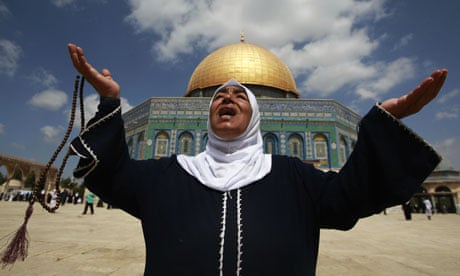Palestinian negotiators secretly agreed to allow Israel to annex all but one of the settlements built in occupied East Jerusalem in the most far-reaching concessions ever made over the bitterly contested city. The offer was turned down by Israel's then foreign minister as inadequate.
Palestinian Authority leaders also privately discussed giving up part of the flashpoint Arab neighbourhood of Sheikh Jarrah, according to leaked documents. And they proposed a joint committee to take over the Haram al-Sharif/Temple Mount holy sites in the Old City of Jerusalem – the highly sensitive issue that, along with refugee rights, sank the Camp David talks in 2000 and triggered the second Palestinian intifada.
The unprecedented offer on the East Jerusalem settlements, made in May 2008, is revealed in confidential Palestinian records of negotiations with Israel in the year before the Gaza war of 2008-09.
Ahmed Qureia, the lead Palestinian negotiator, proposed that Israel annex all Jewish settlements in Jerusalem except Har Homa (Jabal Abu Ghneim) – and hammered home the significance of the concession.
"This is the first time in history that we make such a proposition," he said at a meeting in the city's King David hotel. "We refused to do so in Camp David," he said, referring to the talks where the two sides had come closer than ever to an agreement.
For many Palestinians it is anathema to agree to give up or even swap prime parts of the city they hope to make their capital. The settlements are regarded as illegal in international law and Israel's 1967 annexation of East Jerusalem has never been recognised internationally, though it is supported by a large majority of Israeli Jews – including many who back a West Bank withdrawal.
But the Israeli negotiator Tzipi Livni is recorded as dismissing the offer out of hand because the Palestinians had refused to concede Har Homa, as well as the settlements at Ma'ale Adumim, near Jerusalem, and Ariel, deeper in the West Bank. Israel's position was fully supported by the Bush administration.
"We do not like this suggestion because it does not meet our demands, and probably it was not easy for you to think about it, but I really appreciate it," Livni said.
The Palestinians agreed that Israel could annex French Hill, Pisgat Ze'ev, Neve Ya'akov, Ramat Shlomo and Gilo near Bethlehem – all routinely described as "neighbourhoods" by Israel.
Construction has continued rapidly in East Jersualem in defiance of Barack Obama's call for a freeze. Palestinian Authority leaders have publicly denounced the building work in areas it is now revealed they had agreed in principle to give up. Only last week the Israeli authorities gave the go-ahead for 1,400 new homes in Gilo.
The Palestine Liberation Organisation's chief negotiator Saeb Erekat told the Israeli minister: "It is no secret that … we are offering you the biggest Yerushalayim [the Hebrew word for Jerusalem] in history. But we must talk about the concept of al-Quds [Jerusalem in Arabic]. We have taken your interests and concerns into account, but not all. This is the first time in Palestinian-Israeli history in which such a suggestion is officially made."
The same document reveals that Qureia raised the possibility of the Palestinians conceding part of the predominantly Arab East Jerusalem neighbourhood of Sheikh Jarrah in return for land swaps in line with the pre-1967 map of Israel. The area has been a focus of conflict in recent months because of internationally condemned attempts by rightwing Israeli settlers to take over Palestinian homes.
"So for an area in Sheikh Jarrah, I have to see [an] equivalent area," Qureia is recorded telling the Israeli negotiator Tal Becker in June 2008.
On the most sensitive issue of the Old City's Muslim and Jewish religious sites, Erekat – then chief Palestinian negotiator – told US officials in October 2009 that he was prepared to consider "creative ways" to solve the problem of control of the Haram al-Sharif/Temple Mount. For Muslims across the world, the area is the most important in the conflict and Yasser Arafat's refusal to compromise over its sovereignty triggered the final breakdown at Camp David.
"Even the Old City can be worked out except the Haram and what they call Temple Mount. There you need the creativity of people like me," he explained to US state department official David Hale, emphasising he was speaking in a personal capacity. "It's solved ... there are creative ways, having a body or a committee."
The Palestine papers reveal the twists and turns of feverish talks throughout 2008, with the US closely involved. Condoleezza Rice, Bush's secretary of state, declared in mid-June that an agreement was possible by the end of the year. But the Palestinians complained that Israeli settlement activities were a "deadly" problem. "If they continue they will embarrass us before Palestinian public opinion and the Arab world," Qureia told her.
The documents show how the negotiations were complicated by a private channel between the Palestinian president, Mahmoud Abbas, and Israel's prime minister, Ehud Olmert, who met without aides. In August 2008, Olmert offered Abbas a "package deal" that fell short of Palestinian demands, but it went beyond his negotiating brief and he was forced to resign the following month because of corruption allegations.
Abbas's colleagues complained that they didn't know what happened in the leaders' talks. He was not even allowed to keep the map that accompanied the Israeli offer, the documents reveal.





